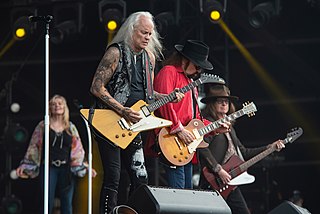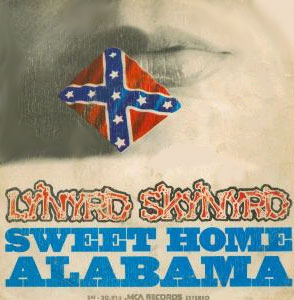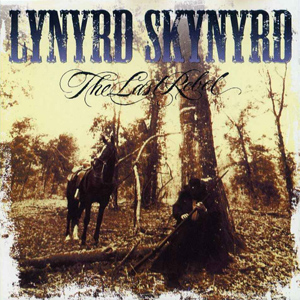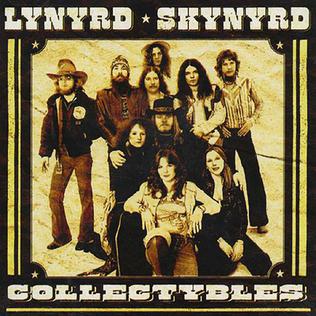Related Research Articles

Lynyrd Skynyrd is an American rock band formed in Jacksonville, Florida in 1964. The group originally formed as My Backyard and comprised Ronnie Van Zant (vocals), Gary Rossington (guitar), Allen Collins (guitar), Larry Junstrom (bass), and Bob Burns (drums). The band spent four years touring small venues under various names and with several lineup changes before deciding on "Lynyrd Skynyrd" in 1968. The band released its first album, (Pronounced 'Lĕh-'nérd 'Skin-'nérd), in 1973. By then, they had settled on a lineup that included bassist Leon Wilkeson, keyboardist Billy Powell, and guitarist Ed King. Burns left and was replaced by Artimus Pyle in 1974. King left in 1975 and was replaced by Steve Gaines in 1976. At the height of their fame in the 1970s, the band popularized the Southern rock genre with songs such as "Sweet Home Alabama" and "Free Bird". After releasing five studio albums and one live album, the band's career was abruptly halted on October 20, 1977, when their chartered airplane crashed, killing Van Zant, Steve Gaines, and backup singer Cassie Gaines, and seriously injuring the rest of the band.

"Sweet Home Alabama" is a song by American rock band Lynyrd Skynyrd, released on the band's second album Second Helping (1974). It was written in response to Neil Young's songs "Southern Man" and "Alabama", which the band felt blamed the entire Southern United States for slavery; Young is name-checked and dissed in the lyrics. It reached number eight on the Billboard Hot 100 chart in 1974, becoming the band's highest-charting single.

"Free Bird", also spelled "Freebird", is a song by American rock band Lynyrd Skynyrd, written by guitarist Allen Collins and lead singer Ronnie Van Zant. The song was released on their 1973 debut studio album. Released as a single in November 1974, "Free Bird" debuted on the US Billboard Hot 100 on November 23 at No. 87 and became the band's second Top 40 hit in early 1975, peaking at No. 19 on January 25. A live version of the song re-entered the charts in late 1976, eventually peaking at No. 38 in January 1977.

Larkin Allen Collins Jr. was an American guitarist, and one of the founding members of the Southern rock band Lynyrd Skynyrd. He co-wrote many of the band's songs with frontman and original lead singer Ronnie Van Zant.

Cynthia Weil was an American songwriter who wrote many songs together with her husband Barry Mann. Weil and Mann were inducted into the Rock and Roll Hall of Fame in 2010. In 1987, she was inducted with her husband into the Songwriters Hall of Fame, and in 2011, they jointly received the Johnny Mercer Award, the highest honor bestowed by that Hall of Fame.
"Southern Man" is a song by Canadian-American singer-songwriter Neil Young, from his album After the Gold Rush, released in 1970. An extended live version can be heard on the Crosby Stills Nash & Young album 4 Way Street.

(Pronounced 'Lĕh-'nérd 'Skin-'nérd) is the debut studio album by American rock band Lynyrd Skynyrd, released on August 13, 1973, by MCA Records. Recording took place in Doraville, Georgia at Studio One, following a lengthy period of rehearsals. Prior to the album's conception, many of its songs were already featured in Lynyrd Skynyrd's live repertoire. To promote it, the band released "Gimme Three Steps" and "Free Bird" as singles; these, along with "Simple Man" and "Tuesday's Gone", are among the band's best-known songs.

Street Survivors is the fifth studio album by the Southern rock band Lynyrd Skynyrd, released on October 17, 1977. The LP is the last Skynyrd album recorded by original members Ronnie Van Zant and Allen Collins, and is the sole Skynyrd studio recording by guitarist Steve Gaines. Three days after the album's release, the band's chartered airplane crashed en route to Baton Rouge, Louisiana, killing the pilot, co-pilot, the group's assistant road-manager and three band members, and severely injuring most who survived the crash.

One More from the Road is a live album by Southern rock band Lynyrd Skynyrd, capturing three shows recorded in July 1976 at the Fox Theatre in Atlanta, Georgia. Since 1974 Lynyrd Skynyrd had supported rock promoter Alex Cooley so that the theatre could be saved from demolition. This record was the band's first live album, and the only live album released during the band's classic era of 1970 to 1977, prior to the plane crash that killed lead singer and songwriter Ronnie Van Zant, guitarist Steve Gaines, and backing singer Cassie Gaines. The album was released in September 1976. It was certified gold by the RIAA on October 26, 1976, platinum on December 30, 1976 and 3× platinum on July 21, 1987.

Gimme Back My Bullets is the fourth studio album by American Southern rock band Lynyrd Skynyrd, released on February 2, 1976. Produced by Tom Dowd, it reached number 20 on the U.S. albums chart and was certified gold on January 20, 1981, by the RIAA.

Skynyrd's Innyrds: Their Greatest Hits is a Lynyrd Skynyrd greatest hits album, released in 1989. The tracks were recorded between 1973 and April 1977.

Clydie Mae King was an American singer, best known for her session work as a backing vocalist. King also recorded solo under her name. In the 1970s, she recorded as Brown Sugar, and her single "Loneliness " reached No. 44 on the Billboard R&B charts in 1973.

Vicious Cycle is the twelfth studio album by Lynyrd Skynyrd, released in 2003. It was the first album recorded by the band following the death of original bassist Leon Wilkeson, who appears on two songs, "The Way" and "Lucky Man", and the song "Mad Hatter" is a tribute to him. The album is the first to feature bassist Ean Evans, the first mainstream album with Michael Cartellone on drums, and the last album that guitarist Hughie Thomasson played on before he died. It included the single "Red, White & Blue" which peaked at number 27 on the US Mainstream Rock charts.

The Last Rebel is the seventh studio album by American rock band Lynyrd Skynyrd, released in 1993. It is the last album to feature drummer Kurt Custer and guitarist Randall Hall.

Twenty is the ninth studio album by American rock band Lynyrd Skynyrd, released in 1997. The title of the album refers to the fact that it had been twenty years since the plane crash which killed original lead singer Ronnie Van Zant, guitarist Steve Gaines, and backup singer Cassie Gaines.

Thomas Delmer "Artimus" Pyle is an American musician who played drums with the southern rock band Lynyrd Skynyrd from 1974 to 1977 and from 1987 to 1991. He and his bandmates were inducted into the Rock and Roll Hall of Fame in 2006.

Skynyrd's First and. .. Last was the original name of a posthumous compilation album first released in 1978 by the rock band Lynyrd Skynyrd. In 1998, it was repackaged, renamed and re-released as Skynyrd's First: The Complete Muscle Shoals Album, being expanded to include eight additional tracks—four of which were previously unreleased and four which would be re-recorded for (Pronounced 'Lĕh-'nérd 'Skin-'nérd). As the renamed title suggests, the album was recorded at Muscle Shoals Sound Studio in Alabama. Originally intended to be their debut album it was shelved, making (Pronounced 'Lĕh-'nérd 'Skin-'nérd) their actual debut. The album was certified Gold on September 8, 1978, and Platinum on November 10, 1978, by the RIAA.

Collectybles is a compilation album by the American Southern rock band Lynyrd Skynyrd, released on November 21, 2000. The two disc set includes early demo recordings, live versions and studio tracks, some previously unreleased.

My World is an album by the American musician Ray Charles, released in 1993. Charles incorporated elements of gospel, funk, and New jack swing.
References
- ↑ "None of Us Are Free", SecondhandSongs.com. Retrieved: 1 September 2014
- ↑ Ankeny, Jason. My World - Ray Charles at AllMusic . Retrieved 14 November 2019.
- ↑ "Ray Charles: Sings 'My World' To Show Concern For Families And Peace", Jet (May 3, 1993), p.64.
- ↑ Norment, Lynn (Jun 1993). ""Sounding Off: The Best in Recording Music", Ebony , Vol. 48, No. 8, p.18. Johnson Publishing Company. ISSN 0012-9011.
- ↑ White, Timothy (March 6, 1993). Music: To My Ears; Ray Charles' Brave New 'World' . Billboard , Vol. 105, No. 10, p.5. Nielsen Business Media. ISSN 0006-2510.
- ↑ Evans, Mike (2009). Ray Charles: Birth of Soul , unpaginated. Omnibus Press. ISBN 9780857120519.
- ↑ Deming, Mark. Don't Give Up on Me - Solomon Burke at AllMusic . Retrieved 14 November 2019.
- ↑ (2002). No Depression , Issues 38-42, p.121.
- ↑ Lasczik Cutcher, Alexandra J. (2017). Moving-With & Moving-Through Homelands, Languages & Memory: An Arts-based Walkography , p.51. BRILL. ISBN 9789463512480.
- ↑ Am I Still in Your Heart - Chuck Negron at AllMusic . Retrieved 14 November 2019.
- ↑ Stanley, Leo. Urban World Music - Hiroshima at AllMusic . Retrieved 14 November 2019.
- ↑ Erlewine, Stephen Thomas . Twenty - Lynyrd Skynyrd at AllMusic . Retrieved 14 August 2011.
- ↑ Deming, Mark. Overnight Sensational - Sam Moore at AllMusic . Retrieved 14 November 2019.
- ↑ Earth to Atlanta - Widespread Panic at AllMusic . Retrieved 14 November 2019.
- ↑ Outtakes - Hanne Boel at AllMusic . Retrieved 14 November 2019.
- ↑ Love is the Golden Rule - Michael English at AllMusic . Retrieved 14 November 2019.